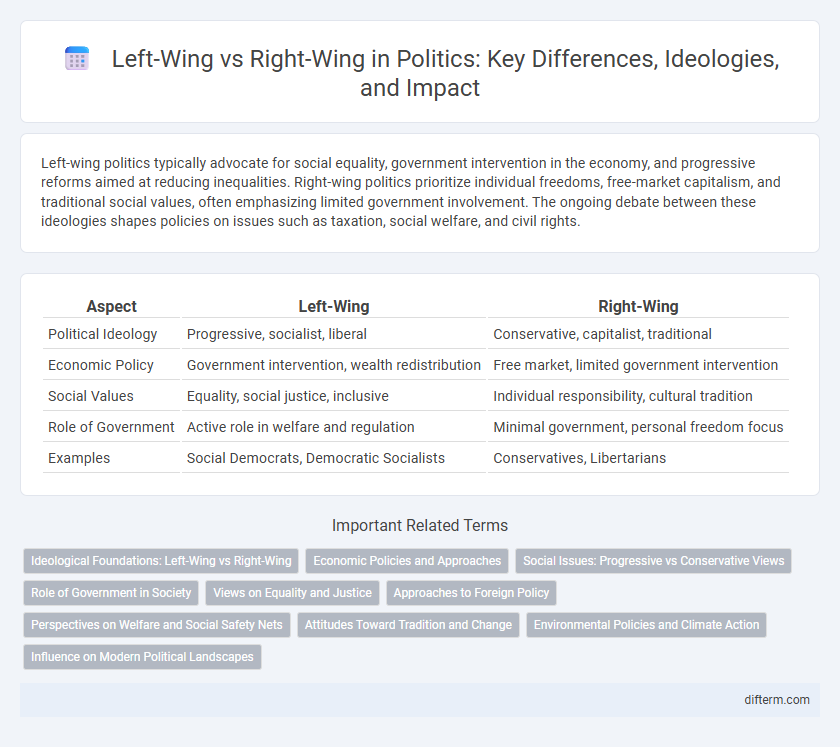Left-wing politics typically advocate for social equality, government intervention in the economy, and progressive reforms aimed at reducing inequalities. Right-wing politics prioritize individual freedoms, free-market capitalism, and traditional social values, often emphasizing limited government involvement. The ongoing debate between these ideologies shapes policies on issues such as taxation, social welfare, and civil rights.
Table of Comparison
| Aspect | Left-Wing | Right-Wing |
|---|---|---|
| Political Ideology | Progressive, socialist, liberal | Conservative, capitalist, traditional |
| Economic Policy | Government intervention, wealth redistribution | Free market, limited government intervention |
| Social Values | Equality, social justice, inclusive | Individual responsibility, cultural tradition |
| Role of Government | Active role in welfare and regulation | Minimal government, personal freedom focus |
| Examples | Social Democrats, Democratic Socialists | Conservatives, Libertarians |
Ideological Foundations: Left-Wing vs Right-Wing
Left-wing ideology emphasizes social equality, government intervention in the economy, and progressive reforms aimed at reducing class disparities, often advocating for wealth redistribution and expanded social welfare programs. Right-wing ideology prioritizes individual liberty, free-market capitalism, and traditional social values, supporting limited government interference and the preservation of established institutions. These ideological foundations shape distinct policy approaches and political priorities within democratic systems worldwide.
Economic Policies and Approaches
Left-wing economic policies emphasize wealth redistribution, progressive taxation, and increased government intervention to reduce inequality and provide social welfare programs. Right-wing approaches prioritize free-market capitalism, lower taxes, deregulation, and limited government involvement to promote economic growth and individual entrepreneurship. The debate between these ideologies centers on balancing social equity with economic efficiency and personal freedom.
Social Issues: Progressive vs Conservative Views
Left-wing politics promote progressive social issues such as LGBTQ+ rights, gender equality, and racial justice, emphasizing government intervention to address systemic inequalities. Right-wing perspectives prioritize traditional values, advocating for limited government involvement, reinforcing family structures, and preserving cultural heritage. Debates often center on policies regarding abortion rights, immigration, and education reforms, highlighting a fundamental ideological divide in societal change approaches.
Role of Government in Society
Left-wing politics generally advocate for a strong governmental role in regulating the economy, providing social welfare, and ensuring equal opportunities through progressive taxation and public services. Right-wing ideologies emphasize limited government intervention, promoting free-market principles, individual responsibility, and reduced public spending to foster economic growth and personal freedom. Debates between these perspectives center on the balance between government control and personal liberty in shaping a just and prosperous society.
Views on Equality and Justice
Left-wing ideologies emphasize systemic equality, advocating for wealth redistribution and social justice policies to address historical and structural inequalities. Right-wing perspectives prioritize individual responsibility and meritocracy, promoting limited government intervention and upholding traditional legal frameworks as the basis for justice. Debates between these positions often hinge on balancing collective welfare with personal freedoms in shaping equitable societies.
Approaches to Foreign Policy
Left-wing foreign policy often emphasizes multilateralism, human rights, and diplomatic engagement, advocating for international cooperation and conflict resolution through global institutions like the United Nations. Right-wing approaches usually prioritize national sovereignty, military strength, and economic interests, favoring unilateral actions and strategic alliances to protect national security. These contrasting strategies shape global diplomacy, with left-wing policies leaning towards peacebuilding and right-wing policies focusing on defense and economic dominance.
Perspectives on Welfare and Social Safety Nets
Left-wing perspectives emphasize expanding welfare programs and social safety nets to address income inequality and provide universal access to healthcare, education, and housing. Right-wing viewpoints prioritize limited government intervention, advocating for personal responsibility and market-based solutions in social welfare systems. These contrasting approaches highlight fundamental differences in prioritizing state support versus individual autonomy in economic and social policy.
Attitudes Toward Tradition and Change
Left-wing ideologies generally advocate for progressive change and challenge traditional social norms, emphasizing social equality and reform. Right-wing perspectives prioritize preserving established traditions and institutions, valuing stability and continuity in social, cultural, and political life. These contrasting attitudes toward tradition and change shape policy debates on issues like civil rights, economic regulation, and cultural values.
Environmental Policies and Climate Action
Left-wing political parties typically prioritize aggressive environmental policies, advocating for renewable energy investments, strict carbon emission regulations, and comprehensive climate action plans to combat global warming. Right-wing parties often emphasize market-driven solutions, promoting energy independence through fossil fuels while supporting gradual transitions to clean energy to balance economic growth and environmental concerns. Key policy debates focus on carbon taxation, government regulation versus private sector innovation, and international cooperation on climate agreements.
Influence on Modern Political Landscapes
Left-wing ideologies have significantly shaped modern political landscapes by advocating for social equality, government intervention in the economy, and expanded welfare policies that address systemic inequalities. Right-wing movements emphasize free-market capitalism, individual liberties, and traditional social values, influencing regulatory frameworks and national identity debates worldwide. The dynamic tension between left-wing and right-wing principles continues to define policy-making processes, electoral strategies, and ideological polarization in contemporary democracies.
left-wing vs right-wing Infographic

 difterm.com
difterm.com